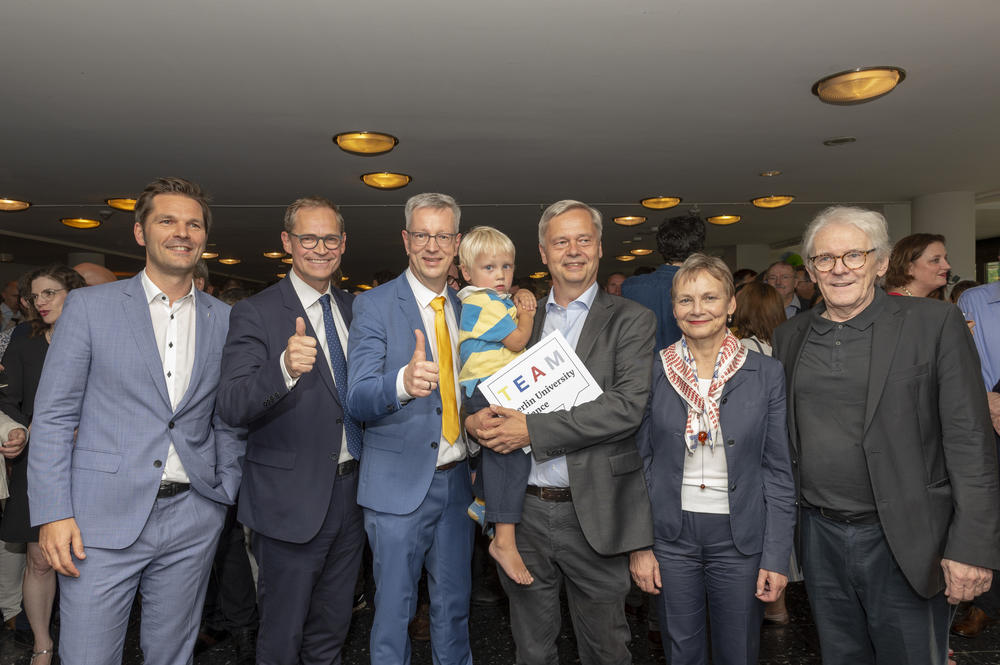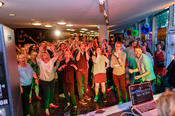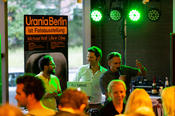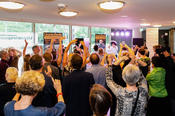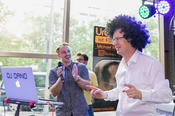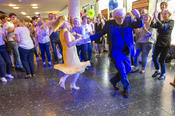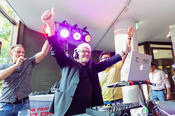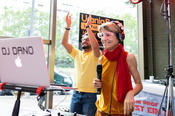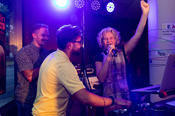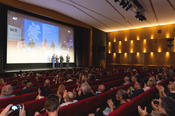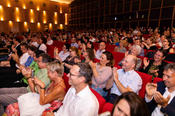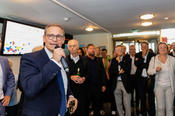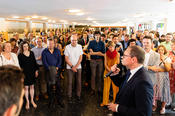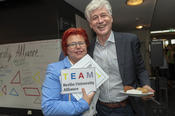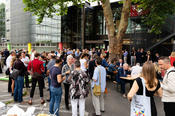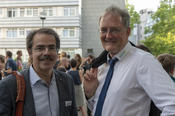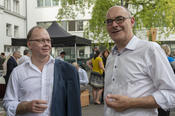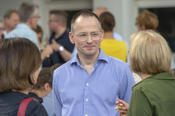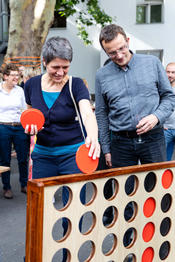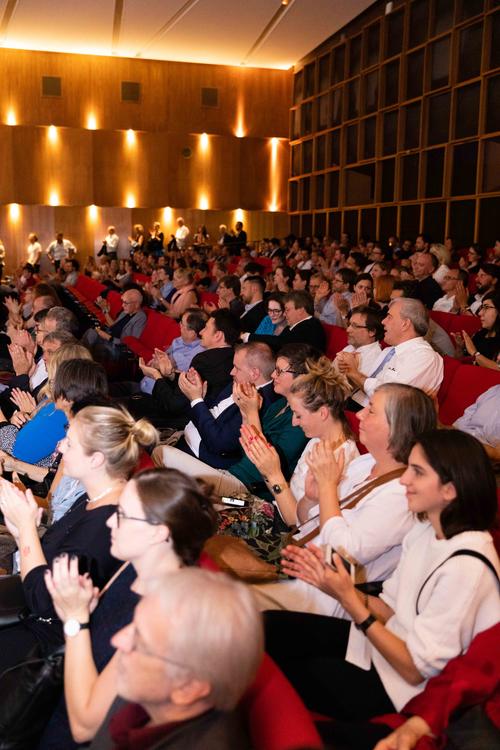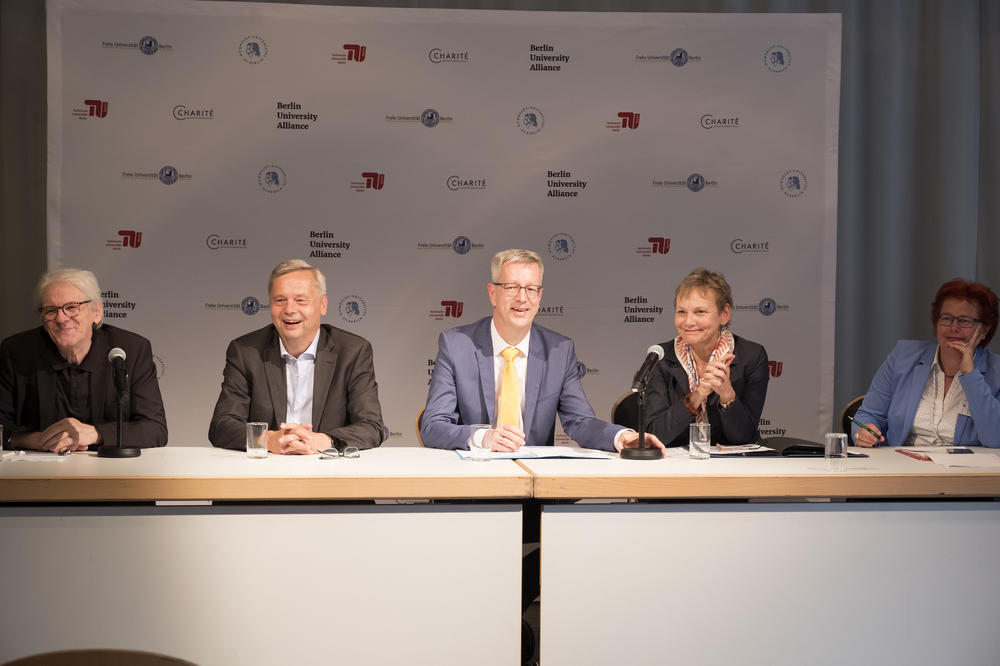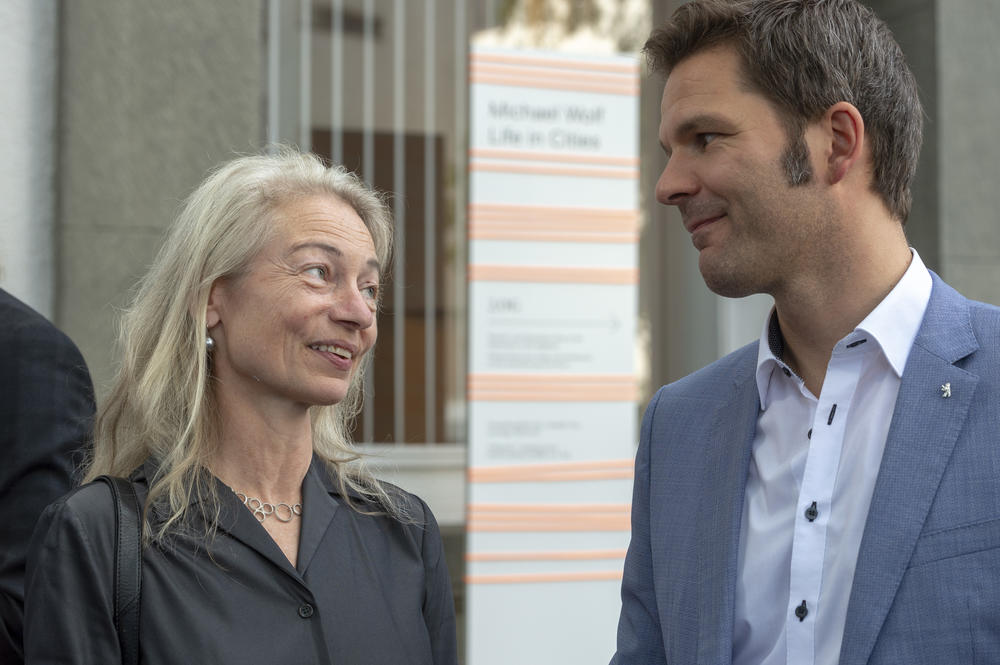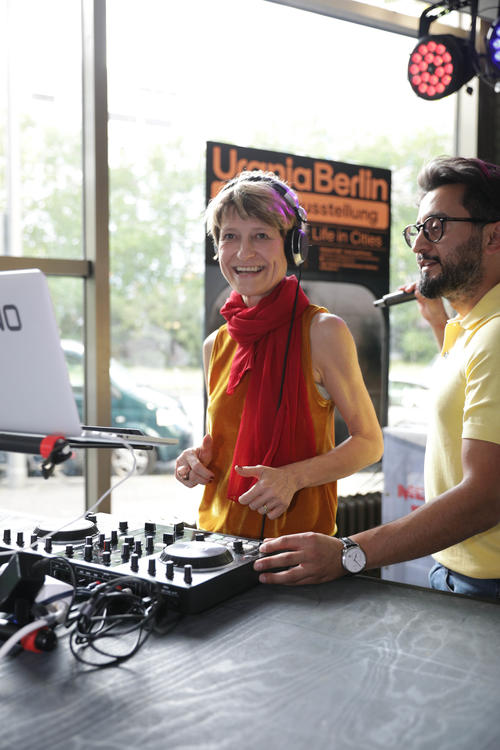Party of Four
At the Urania, the Berlin University Alliance celebrated its success in the German government’s Excellence Strategy competition
Jul 21, 2019
United in joy: State Secretary Steffen Krach, Governing Mayor of Berlin Michael Müller, Günter M. Ziegler (Freie Universität), Christian Thomsen (Technische Universität), Sabine Kunst (Humboldt-Universität), and Karl Max Einhäupl (Charité).
Image Credit: Bernd Wannenmacher
When Günter M. Ziegler, President of Freie Universität Berlin, stands next to DJ Dano behind the turntables and raises his hands to the sky to the sounds of “Under Pressure,” there is no holding back. Angela Ittel, Vice President of Technische Universität, whirls across the floor in a yellow party dress, and Karl Max Einhäupl, Chief Executive Officer of Charité – Universitätsmedizin Berlin, proves his talent as an experienced ballroom dancer, a bright smile across his face, while everywhere around him people on the dance floor clap their hands to the beat of the music, shout and jump around. On this Friday evening, the Arnheim foyer of the venerable Urania building resembles a disco. “Sekt oder Selters?” – This was the feast-or-famine motto of the Berlin University Alliance’s invitation to the event center in Berlin-Schöneberg for the live stream announcement of the Excellence Strategy winners. Shortly after 4 p.m, it is clear: They have done it – the party can start!
A few hours earlier however, the nail-biting suspense is palpable. Around 3.30 p.m., the foyer starts filling up. The rbb broadcasting service has sent a camera crew; journalists from the Frankfurter Allgemeine, Berliner Zeitung, Tagesspiegel, dpa, Focus, and B.Z. have pulled out their phones and laptops. Near the entrance, Theo Roelofs from the office of the Math+ Cluster of Excellence and some of his colleagues have gathered at a bar table and are sipping champagne. “I am here today because a lot depends on this decision,” says the mathematician. For the first time ever, Freie Universität Berlin, Humboldt-Universität zu Berlin, Technische Universität Berlin, and Charité - Universitätsmedizin Berlin have joined the nationwide Excellence competition collectively. At stake are millions of euros of grant funds, but also prestige or the loss of reputation: Freie Universität has held the title of Excellence since 2007, Humboldt-Universität since 2012. Theo Roelofs is confident that things will go well: “After all, the Berlin University Alliance is a unique consortium that transcends institutional boundaries.”
“A lot depends on this decision.”
Tina Kasal-Slavik is waiting for an acquaintance at the coat check. Just recently, in a tough competition, the postdoctoral researcher prevailed against numerous competitors and won the Research to Market Challenge, a competition for business and start-up ideas originating from the research of the four consortium partners. She can therefore easily empathize with the competitors today, who will find out in a few minutes whether they are among the winners of the prestigious Excellence Strategy competition or whether they are going away empty-handed. “Of course I will cheer them on and I’m keeping my fingers crossed,” says the biologist and start-up founder. Irrespective of the decision, she is already looking forward to the party afterwards and to the “unique opportunity to talk to so many top researchers.”
Waiting for the decision: the press conference of the German Council of Science and Humanities in Bonn was broadcast in Urania’s movie theater.
Image Credit: Felix Noak
One of them is Matthias Drieß, who has settled in the back rows of the Humboldt Hall on one of the red-velveted armchairs to watch the live broadcast of the decision announcement in Bonn. The chemist at Technische Universität and spokesperson of the UniSysCat Cluster of Excellence is relaxed and in a good mood. “With so much preparatory work, I am sure we have a good chance of winning,” he firmly believes. A few rows in front of him, Andrew J. Johnston is a little more anxious. “I am seriously nervous – but extremely confident,” says the literary scholar [JJ1] [DN2] and one of the speakers of the Temporal Communities Cluster of Excellence at Freie Universität Berlin. “In any case, I believe that we deserve the win because we have been working together for a long time and have shown that Berlin is one location and not many locations next to each other.”
When the live broadcast from Bonn begins at 4 p.m. on the dot, the now well-filled hall has become quiet. Martina Brockmeier, Chairperson of the German Council of Science and Humanities, builds up the tension. She is impressed by “the high level of German universities,” which she says are “optimally positioned in every respect,” praises the “enormous accomplishment” of the 19 contestants, 11 of whom will be able to call themselves excellent in just a few minutes, and announces that the decision was made unanimously. When Anja Karliczek, Federal Minister of Education and Research, finally steps up to the microphone and praises the day as the “culmination” of a lengthy decision-making process, the livestream actually cuts out. But only for a few seconds. The words that everyone in the hall has been waiting for are again clearly audible: the Berlin University Alliance is among the winners.
“We have been working together for a long time and have shown that Berlin is one location and not many locations next to each other.”
In the front row, Sabine Kunst, President of Humboldt-Universität, Karl Max Einhäupl, Chief Executive Officer of Charité, Christian Thomsen, President of the Technische Universität, and Günter M. Ziegler, President of Freie Universität, are no longer seated. In the flurry of camera flashes, the four of them fall into each other’s arms. Anja Karliczek’s remarks that “the best of the best has been chosen” are almost entirely drowned out by the cheers of the audience.
The first press conference of the Berlin University Alliance: Karl Max Einhäupl, Sabine Kunst, Günter M. Ziegler, Christian Thomsen, and Stefanie Terp, Press Spokesperson of Technische Universität Berlin.
Image Credit: Matthias Heyde
At the press conference that follows, Ziegler, the spokesperson of the Alliance, emphasizes the joint achievement “of which we can be really proud.” Sabine Kunst is pleased that the Excellence Commission has rewarded the willingness of the Berlin partners to “build up a joint infrastructure.” Christian Thomsen praises the many ideas t developed for the joint proposal, which were the basis of its success. It is a mix of joy and relief for Karl Max Einhäupl too, for whom a negative decision would have “botched the whole day, the whole week, the whole year,” and who attributes the success to the great cooperative commitment. “Who in their wildest dreams would have imagined five years ago that it would one day be possible bring all the three Berlin universities together,” asks the physician, eliciting a burst of laughter.
“This success is historic!”
On this evening, there is champagne and juice, sausages and coleslaw, sandwiches and vegetable skewers – but only one topic. “This success is historic!” says Gabriele Metzler, historian and Dean of the Faculty of Arts and Humanities at Humboldt-Universität. After more than 200 years of emphasizing differences in the academic landscape due to historical circumstances, she explains, the consortium comes as a promising sign of a new development in cross-border cooperation. Sabine Kunst is congratulated from all sides in the foyer. She is convinced that with the positive decision from Bonn, “Interdisciplinarity and cooperation were rewarded.” She adds that the decision sends an important message, illustrating Berlin’s “pioneering position in the international scientific community.
Beatrice Gründler, Professor of Arabic Studies at Freie Universität Berlin, and State Secretary Steffen Krach in conversation.
Image Credit: Bernd Wannenmacher
In the courtyard of the Urania, which has become a beer garden on this warm summer evening, State Secretary Steffen Krach and Leibniz Prize winner and Arabic specialist Beatrice Gründler from Freie Universität discuss the result of the competition between benches, a sausage stand, and plant crates full of mint and thyme. This result was not necessarily a sure fire thing, emphasizes the politician. He sees the on-site visit [JJ1] of the evaluation group to the four Berlin locations as contributing to their success. During the evaluation, it was clear that “All four partners are serious about the cooperation.” The positive decision honors Berlin’s vision of taking the capital city to a new level as a center of science and research. Beatrice Gründler is particularly pleased with the team spirit and perseverance with which researchers and politicians across disciplines and institutions have dedicated themselves to the project in recent years. She adds that the state of Berlin has made a decisive contribution to this success through its efforts. The new dynamic that has emerged in Berlin as a result of the competition is “much more important than the money that is now flowing,” she explains. “I have gained many new contacts in this interdisciplinary process,” the Arabic specialist says with a smile.
The fact that Berlin’s Governing Mayor Michael Müller would come visit the Urania twice on one day – directly after his return from Bonn in the afternoon to congratulate and later in the evening again to celebrate – shows just how close the Alliance project is to the hearts of politicians and how thrilled they are, too.
“We know each other much better now and see each other in a whole new way.”
Sabine Meurer from the Strategic Planning Office of Humboldt-Universität is also clearly relieved about the decision. Together with colleagues from all of the institutions, she coordinated the proposal. She recalls the intensive preparatory work for a structure that was “unique in terms of science and politics.” “It was a three-year-long process. The researchers repeatedly demonstrated how different levels can be brought together and how hurdles can be overcome together. Today, we can see that all that work was well invested.”
Setting the mood as first DJ: Vice President Angela Ittel of Technische Universität Berlin on the turntables.
Image Credit: Felix Noak
Anita Traninger is also in a celebratory mood. The literary scholar, who is in the best of spirits after the decision, emphasizes the benefit of interdisciplinary and cross-institutional cooperation, “We know each other much better now and see each other in a whole new way.” She adds that Berlin has been a top location for the humanities for thirty years, but within the framework of the consortium, completely different synergies have emerged. “Through our work together, I got to know computer scientists from Fraunhofer Fokus who deal with network analysis,” says Traninger, adding that their perspectives will now flow into the work of the Temporal Communities Cluster of Excellence, which she coordinates together with Andrew J. Johnston as spokespersons.
The approximately 600 party guests from the four institutions in the Urania now have the opportunity to get to know each other even better and make new contacts. DJ Dano has a whole DJ crew helping him out this evening. In addition to University President Günter M. Ziegler, Vice President Angela Ittel, a “passionate dancer,” will also take to the decks, along with Chief Executive Officer Karl-Max Einhäupl, Vice President Eva Inés Obergfell of Humboldt-Universität, and State Secretary Steffen Krach. “I would only let myself get this carried away for the consortium,” Angela Ittel confesses. The Berlin University Alliance brings out many unexpected talents.

